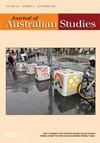Everywhen: Australia and the Language of Deep History
IF 0.4
3区 历史学
Q3 AREA STUDIES
引用次数: 0
Abstract
extra-territorial power of a dependent country such as his native Brazil was always checked by regional limitations, in contrast to great powers that are territorially unconstrained to act globally. In the Australian case, it was used memorably by McQueen—Chapter 4 of A New Britannica is titled “Sub-Imperialists”—and more recently by Cait Storr in an important article for the Melbourne Journal of International Law. Fernandes cites Storr’s article but does not comprehensively engage with it, or other uses of his titular concept. A historian might wish for more nuance in the elaboration of Australian sub-imperialism over time. Fernandes outlines Australia’s contribution to imperial misadventures in the postWWII era—from wars aimed at suppressing Asian nationalism (Korea, Malaya, Vietnam), to Australian intelligence agencies’ role in the coup against Chilean president Allende in 1973, to the greenlighting of Indonesia’s invasion of Timor-Leste. Yet were the motivations identical in each case? What gets lost in subsuming each episode under the same rubric? What kinds of changes and continuities can we observe in the career of Australian sub-imperialism over the course of the past 150 years? These minor quibbles should not detract from the major contribution of this timely and provocative book. Sub–Imperial Power is polemical in the best possible sense, designed to reignite debate in an area of public policy that has been sclerotic for too long. In his unflinching assessment of Australia as a “tributary”, “sentinel” state and his dethroning of the “experts” who buttress the Canberra consensus, Fernandes makes a refreshing call for “long-term collective efforts to reveal rather than mystify Australian foreign policy” (124). It is an ideal towards which we ought to continue to strive, in spite of the difficulties. To question Australia’s participation in wars of aggression abroad in the context of our vanishing national sovereignty has never been more urgent.无处不在:澳大利亚和深厚历史的语言
像他的祖国巴西这样的附属国的治外法权总是受到地区限制的制约,与之形成鲜明对比的是,大国在采取全球行动时不受领土限制。在澳大利亚的案例中,麦奎因在《新大英百科全书》第4章的标题是“次帝国主义者”,而在最近的《墨尔本国际法杂志》上,Cait Storr在一篇重要的文章中也使用了这个词。费尔南德斯引用了斯托尔的文章,但并没有全面地参与其中,也没有对他的名义上的概念进行其他使用。历史学家可能希望随着时间的推移,对澳大利亚次帝国主义的阐述能有更多的细微差别。费尔南德斯概述了澳大利亚对二战后帝国灾难的贡献——从旨在压制亚洲民族主义的战争(朝鲜、马来亚、越南),到澳大利亚情报机构在1973年推翻智利总统阿连德的政变中所扮演的角色,再到为印度尼西亚入侵东帝汶开光。然而,这两种情况的动机是相同的吗?把每一集都放在同一个标题下会失去什么?在过去150年的澳大利亚次帝国主义的发展历程中,我们可以观察到什么样的变化和连续性?这些小的诡辩不应减损这本及时且具有挑衅性的书的主要贡献。从最好的意义上说,“次皇权”是一种争议性的东西,旨在重新点燃一个长期僵化的公共政策领域的辩论。费尔南德斯毫不畏惧地评价澳大利亚是一个“朝贡”、“哨兵”国家,并将支持堪培拉共识的“专家”赶下了山。费尔南德斯发出了一个令人耳目一新的呼吁,呼吁“通过长期的集体努力,揭示而不是使澳大利亚的外交政策变得神秘”(124页)。这是一个理想,我们应该继续努力,尽管困难。在我们国家主权正在消失的背景下,质疑澳大利亚参与海外侵略战争的行为从未像现在这样紧迫。
本文章由计算机程序翻译,如有差异,请以英文原文为准。
求助全文
约1分钟内获得全文
求助全文
来源期刊

Journal of Australian Studies
Multiple-
CiteScore
0.90
自引率
20.00%
发文量
56
期刊介绍:
The Journal of Australian Studies (JAS) is the journal of the International Australian Studies Association (InASA). In print since the mid-1970s, in the last few decades JAS has been involved in some of the most important discussion about the past, present and future of Australia. The Journal of Australian Studies is a fully refereed, international quarterly journal which publishes scholarly articles and reviews on Australian culture, society, politics, history and literature. The editorial practice is to promote and include multi- and interdisciplinary work.
 求助内容:
求助内容: 应助结果提醒方式:
应助结果提醒方式:


